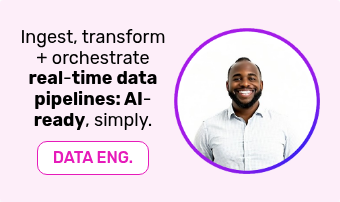In the evolving industrial landscape, the integration of AI is no longer a luxury but a necessity.
Digital teams are at the forefront of this transformation, leveraging AI to drive operational efficiency, predictive maintenance, and data-driven decision-making.
This article explores how you can harness the power of AI to revolutionise industrial businesses and highlights a real-world case study of a recycling plant that achieved remarkable results.
AI Applications in Industry.
Digital teams in industrial businesses are leveraging AI in multiple ways to enhance operations across a multitude of scenarios, such as:
- Real-Time Data Integration + Analysis: AI enables the seamless integration and analysis of real-time data from multiple sources, providing immediate insights and allowing for quick decision-making.
- Predictive Maintenance: AI-powered predictive maintenance helps in identifying potential issues before they cause downtime, thereby reducing maintenance costs and improving equipment reliability.
- Improving Energy Efficiency: AI can analyse energy usage patterns and optimise energy consumption across operations. For example, AI can suggest ways to reduce energy usage during peak hours or recommend more efficient operational schedules, resulting in significant cost savings and reduced environmental impact.
- Enhancing ESG + Safety: AI solutions contribute to Environmental, Social, and Governance (ESG) goals by monitoring compliance with environmental regulations, ensuring workplace safety, and optimising waste management. AI can also predict and prevent safety incidents, ensuring a safer work environment for employees.
- Production Optimisation: AI-driven analytics can optimise production processes by identifying bottlenecks, predicting maintenance needs, and recommending process improvements. This leads to increased production efficiency, reduced downtime, and better resource utilisation.
Overcoming Traditional AI Challenges.
Despite the clear benefits, integrating AI into industrial operations comes with its own set of challenges:
- Complex Operations: The complexity of industrial operations and the unique needs of different business units often require highly customised AI solutions.
- Legacy Systems: Many industrial businesses rely on legacy systems that are not designed to handle modern AI applications.
- Integration Issues: Integrating data streams, asset, devices, and existing systems to create a single source of truth can be impossible.
- Real-time analysis: Effective industrial AI relies on the use of collated real-time data upon which an algorithm can utilise in the moment. Delays mean optimisations are lost, issues become problems, and potential harm results in serious incidents.
Digital teams are overcoming these barriers by adopting flexible, scalable integrated real-time data, AI + IoT platforms to develop highly-customised applications for their business, rapidly (see Rayven for example).
These are advanced, all-in-one platforms that enable digital teams to easily integrate data sources from anywhere, analyse them in real-time, train and utilise automations and AI across all integrated technologies, and design front-end dashboards and interfaces for users - everything needed to create future-proof real-time data and AI applications, simply.
This technology is known as an integrated real-time data, AI + IoT platforms, but could also be seen to be a PaaS, IoT, AI, ETL, BI and integration platform all rolled into one.
Case Study: Transforming a Recycling Plant with AI.
A prime example of how digital teams are leveraging AI in industrial businesses is the case of a recycling plant that implemented an energy efficiency solution to enhance its operations and improve on the bottom-line.
The challenge.
The recycling plant faced several operational inefficiencies, including frequent equipment downtime, high maintenance costs, and the inability to process real-time data effectively.
The solution.
The digital team deployed an integrated solution that utilised AI for real-time monitoring and predictive insights. Key features of the solution included:
- Real-time data integration: The system integrated data from various sensors and legacy systems, providing a comprehensive view of the plant’s operations.
- AI-Powered Predictive Maintenance + energy insights: The AI model analysed real-time data to predict equipment failures, allowing for proactive maintenance and reducing downtime. It additionally provided insights on how energy savings could be found.
- Customisable dashboards: The solution offered customisable dashboards that provided actionable insights and enabled the team to monitor performance metrics in real-time.
The outcome.
The implementation resulted in significant improvements:
- Reduced downtime: Predictive maintenance reduced equipment downtime by 30%.
- Lower maintenance costs: The plant saw a 20% reduction in maintenance costs.
- Improved operational efficiency: Real-time data integration and analysis allowed for better decision-making and optimised operations.
You can read more about this here.
Key Benefits of Leveraging AI.
The integration of AI into industrial operations offers several key benefits:
- Enhanced Decision-Making: AI provides real-time insights and predictive analytics, enabling better decision-making and strategic planning.
- Operational Efficiency: Automation and AI-driven processes improve operational efficiency, reduce waste, and increase productivity.
- Custom AI Models: Businesses can train AI models on their unique data, providing tailored recommendations and optimisations that directly impact their operations.
- Scalability + Flexibility: AI solutions are scalable and flexible, allowing businesses to start small and expand their AI capabilities as needed.
As the industrial landscape continues to evolve, the integration of AI is proving to be a game-changer for industrial businesses. By leveraging AI, industrial businesses can overcome traditional challenges, enhance operational efficiency, and drive innovation.
Rayven is an all-in-one real-time data, AI + IoT platform with unique industrial Generative AI and custom application building capabilities. We deliver an easy-to-use, codeless toolkit that anybody can use to integrate, ETL and analyse all their data in real-time; build custom workflows and automations; leverage Machine Learning and predictive analytics; create, train, and deploy custom LLMs bespoke to their needs; and create the interfaces, alerts and reports that frontend users need to optimise, innovate and create.
Get everything you need to succeed with industrial Generative AI today and build custom AI applications fast and affordably: speak to us now to find out more and get started.





















